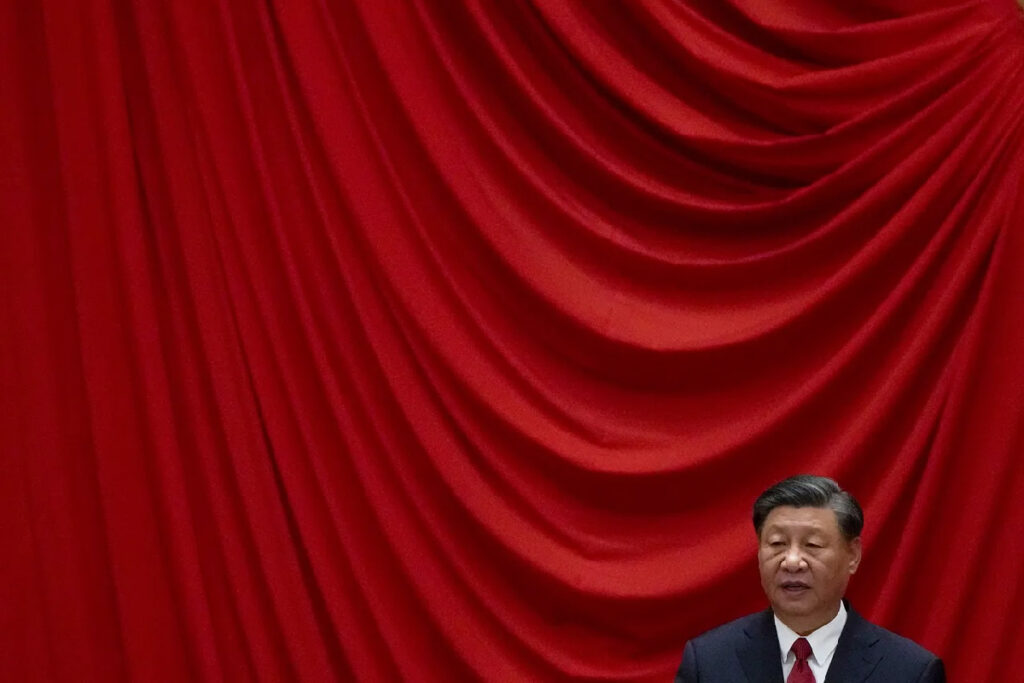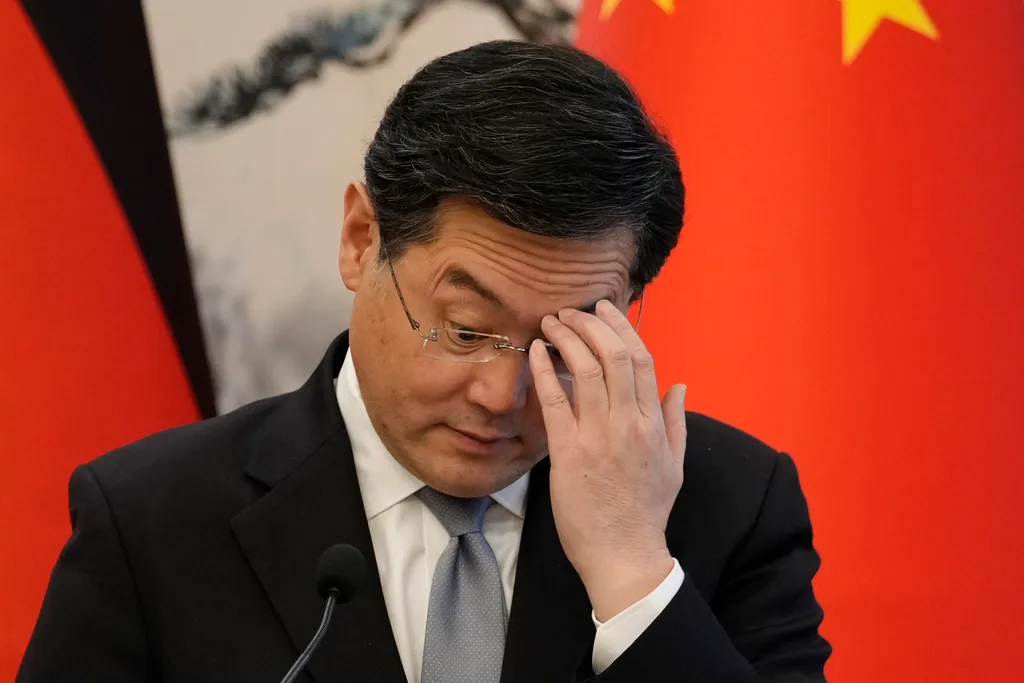In a sign of instability in Beijing’s top ranks, foreign policy and defense officials are vanishing as Xi roots out perceived enemies.

Since his reign began in 2012, Xi’s endless purges have removed millions of officials | Andy Wong-Pool/Getty Images
(Written by Politico, originally published here, republished with permission.)
Something is rotten in the imperial court of Chairman Xi Jinping.
While the world is distracted by war in the Middle East and Ukraine, a Stalin-like purge is sweeping through China’s ultra-secretive political system, with profound implications for the global economy and even the prospects for peace in the region.
The signals emanating from Beijing are unmistakable, even as China’s security services have ramped up repression to totalitarian levels, making it almost impossible to know what is really happening inside the country.
The unexplained disappearance and removal of China’s foreign and defense ministers — both Xi loyalists who were handpicked and elevated mere months before they went missing earlier this year — are just two examples.
Other high-profile victims include the generals in charge of China’s nuclear weapons program and some of the most senior officials overseeing the Chinese financial sector. Several of these former Xi acolytes have apparently died in custody.
Another ominous sign is the untimely death of Li Keqiang, China’s recently retired prime minister — No. 2 in the Communist hierarchy — who supposedly died of a heart attack in a swimming pool in Shanghai in late October, despite enjoying some of the world’s best medical care. Following his death, Xi ordered public mourning for his former rival be heavily curtailed.
In the minds of many in China, “heart attack in a swimming pool” has the same connotation that “falling out of a window” does for Russian apparatchiks who anger or offend Vladimir Putin.
Since his reign began in 2012, Xi Jinping’s endless purges have removed millions of officials — from top-ranked Communist Party “tigers” down to lowly bureaucratic “flies,” to use Xi’s evocative terminology.
What’s different today is that the officials being neutralized are not members of hostile political factions but loyalists from the inner ring of Xi’s own clique, leading to serious questions over the regime’s stability.
With such a febrile atmosphere in the celestial capital of Beijing, there are fears that an isolated and paranoid Chairman Xi could miscalculate, provoke armed conflict with one of its weaker neighbors or even launch a full-scale invasion of democratic Taiwan in order to distract from his domestic troubles.
Enemies everywhere
The political earthquakes rippling out from the old imperial leadership compound of Zhongnanhai are exacerbating the already dire state of the Chinese economy.
“We see a China domestically that is challenged; an aging society, demography, a severe housing crisis, slowing down growth, unexpected unemployment because the young generation leaving university does not find adequate jobs in the private sector anymore,” European Commission President Ursula von der Leyen, who heads to Beijing this week with her European Council counterpart Charles Michel for the first face-to-face EU-China meeting in nearly five years, told POLITICO last week. “So quite some challenges domestically.”
Chinese financiers and businesspeople (quietly) complain they are required to spend countless hours studying “Xi Jinping Thought on Socialism with Chinese Characteristics for a New Era” — a painfully turgid governing mantra that boils down to ideology-free totalitarian rule and the return of a personality cult to China.
In recent weeks, the country’s leading investment bank banned negative macroeconomic or market commentary, as well as any behavior that could suggest its bankers lead “hedonistic lifestyles.”
Not long after he ascended to chairmanship of the Communist Party in 2012, Xi began purging his real and perceived enemies in an “anti-corruption” campaign that never really ended.
Hundreds of senior officers in the People’s Liberation Army (PLA), as well as thousands of top Party officials, have been arrested, disappeared or “suicided” (driven to commit suicide or killed in circumstances made to look like suicide).
The beneficiaries of this perennial purge have been provincial bureaucrats who worked with Xi earlier in his career and whose main qualification is unquestioning loyalty to the “people’s leader.”
Small town boys
These former small-town officials now make up the majority of the Standing Committee of the Politburo, which wields ultimate power in China.
One such loyal figure was Qin Gang, a former spokesman for the Chinese foreign ministry whose career went stratospheric after he became China’s chief protocol officer, overseeing most of Chairman Xi’s interactions with foreign dignitaries between 2014 and 2018.
After a brief stint as a vice foreign minister, Qin was named ambassador to Washington in July 2021 and foreign minister barely 18 months later — a uniquely rapid rise that Chinese officialdom attributed to his proximity and personal favor with the “core leader.”
On June 25 this year, barely six months after becoming minister, Qin held meetings in Beijing with the foreign ministers of Sri Lanka and Vietnam, as well as Deputy Russian Foreign Minister Andrey Rudenko.
Then he vanished.
According to several people with access to high-level Chinese officials, Rudenko’s real mission in Beijing was to inform Xi that his foreign minister and several top officers in the PLA had been compromised by western intelligence agencies.
Following his disappearance, lurid tales emerged of Qin’s affair with a reporter for Chinese broadcaster Phoenix TV called Fu Xiaotian, with whom he allegedly fathered a son who is a U.S. citizen. The stories circulated widely online with the apparent consent of Chinese cyber censors.

After a brief stint as a vice foreign minister, Qin was named ambassador to Washington in July 2021 and foreign minister barely 18 months later — a uniquely rapid rise | Pool photo by Suo Takekuma via Getty Images
Fu attended Cambridge University, a traditional recruiting ground for Britain’s intelligence agencies, and first met Qin more than a decade ago when he was posted to the Chinese Embassy in London.
In 2016, Churchill College, Fu’s alma mater at Cambridge, named a garden after her in gratitude for her “very rare … series of generous gifts,” reportedly adding up to at least £250,000, an enormous sum for most journalists.
Before the foreign minister disappeared, Fu all but named Qin as the father of her child on social media.
Then, in April, she flew back to Beijing on what appears to have been a government-chartered private jet and has not been heard from since.
China’s propaganda system is strongly hinting that the affair and illegitimate American child are the reasons for Qin’s purge.
Rocket men
According to several people with access to top officials, the real reason for his abrupt disappearance was Qin’s involvement in a much more serious scandal, involving the defense minister and the generals who commanded China’s “rocket force,” which oversees the country’s nuclear weapons program.
At almost the same time Qin went missing, the top commander of the rocket force, Li Yuchao, along with his deputy Liu Guangbin and former deputy Zhang Zhenzhong, all also disappeared.
Several other senior serving and former officers from the force were likewise detained and at least one former deputy commander died of unspecified illness, according to state media reports.
The missing commanders were eventually formally fired and replaced by officers from the navy and airforce, a very rare development since top commanders of the rocket force have almost always been promoted from within the service.
Not long after the rocket force purge was officially acknowledged, Li Shangfu, the man Xi picked as China’s defense minister in March this year, also vanished. His formal dismissal was announced in late October.
Further adding to the intrigue was a terse state media report on the day before Qin was formally removed as foreign minister in July. It said Wang Shaojun, commander since 2015 of the Central Guard unit that protects China’s top leaders and oversees Chairman Xi’s personal bodyguard, had died three months earlier due to “ineffective medical treatment.”
China’s nuclear weapons program has massively expanded in recent years and, according to people with access to top Chinese officials, Russian Deputy Minister Rudenko’s message to Xi included allegations that Qin and relatives of top rocket force officers had helped pass Chinese nuclear secrets to Western intelligence agencies.
Two of these people claim that Qin died, either from suicide or torture, in late July in the military hospital in Beijing that treats China’s top leaders.
Hostile forces
Given the opacity of the Chinese system, it is impossible to confirm these accounts definitively and the Chinese government does not comment on the inner workings of the Communist Party.
Senior Western intelligence officials declined to comment or discuss the matter when asked about the purges in China.
But the sensational nature of the claims themselves make clear the feverish paranoia permeating Beijing.
Whether by accident or design, that mood was exacerbated over the summer when Director of the U.S. Central Intelligence Agency Bill Burns said the CIA had “made progress” rebuilding its network within China and had a “strong human intelligence capability” in the country.
That paranoia extends into all parts of the bureaucracy and economy and seems to have tarnished anyone seen as too Westernized or too close to “hostile Western forces.”
One senior Chinese finance official who speaks fluent English and is a regular fixture on the international conference circuit told POLITICO by email that he could no longer attend an upcoming event outside China and was unable to speak on the phone.
He joins dozens of senior finance officials who have been removed in recent months, often after being accused of corruption.
An associate of this official said he was currently being investigated for being “too close to America” and “possibly a spy.”
This seems to be the inevitable fate of anyone who engages too eagerly with foreigners and should serve as a warning to those who still believe China is open for business with the West.








